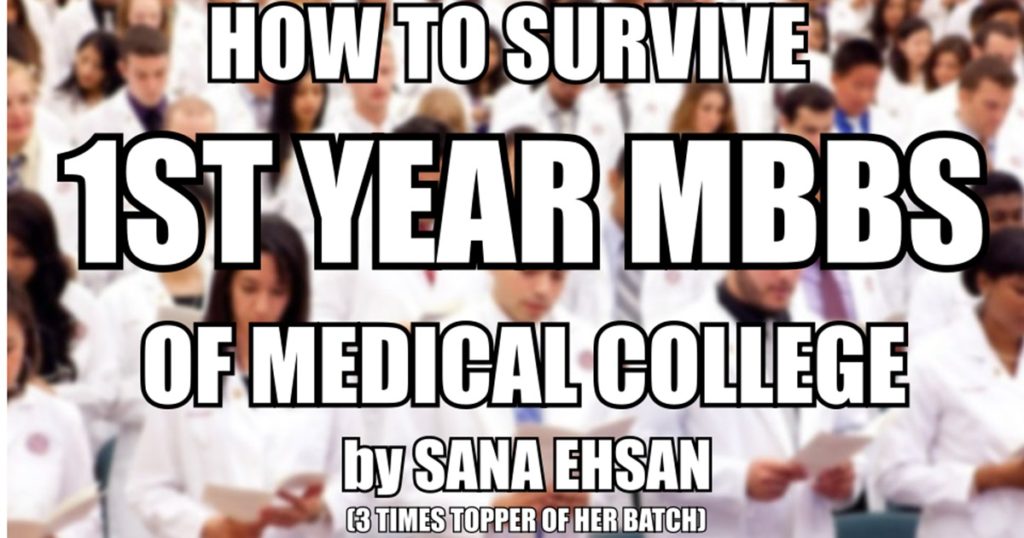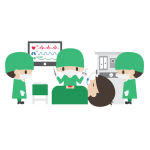And so here it begins: Final Year MBBS — the GRAND FINALE! One of the most hectic years of MBBS that requires a lot of patience and tolerance. It’s a two-way traffic; clinical and theoretical, a knowledge-acquiring-process which goes hand in hand. I’m sharing some of my experiences and tips with the hope that it will help all those medical students who are about to embark on this perilous yet incredible journey of the final year MBBS. I will show you how you can tackle this giant monster and survive like a true warrior. 🙂

MEDICINE
Medicine is huge but not boring. It’s deep but you can swim. Pick one book from the very first day and stick to it. Don’t switch books. Medicine books which most of the students study in the final year MBBS are:
1. DAVIDSON: Study once and retain for life. It requires less revision.
2. Kumar and Clark: Very extensive. Inam Danish is the copy paste of this book. Its language is more friendly than Davidson.
3. Kaplan Medicine: Good book but lacks some of the details like Chronic Liver Disease (CLD), Stroke etc. Still, it’s life-saving and very good for prof. exams.
Viva Questions of Medicine
There will be three vivas:
SHORT CASE SIR ZAHIR KHAN MANDOKHAIL:
For short cases, make your clinical methods (reflexes) strong in each rotation of medicine. Sir Zahir will ask you to perform procedures such as:
- Spleen palpation
- Ankle jerk
- Knee-jerk
- liver span
- Shifting dullness.
His questions this year were :
- Causes of splenomegaly
- Causes of tender splenomegaly
- Causes of massive splenomegaly
- Causes of hepatomegaly
- Sickle cell anemia
- Cerebellar dysfunction signs
- Obstructive sleep apnea
- Signs of hyper and hypothyroidism
- Polyglandular syndromes
- Type 1 and type 2 respiratory failure
- Difference between paralysis and paresis
- Pneumothorax
- Diabetic ketoacidosis (DKA)
- Atrial septal defect (ASD)
- Ventricular Septal Defect (VSD)
- Typhoid
- Oesophageal varices
Sir Zahir mostly repeats his questions throughout the day. But next day his questions would be completely different.
LONG CASE OF SIR BAQI DURRANI:
Write your history properly. Sometimes he asks you to narrate presenting complaints, sometimes he doesn’t, depends on your luck. For his viva take his classes regularly and note each and every point. And for viva dress up nicely, wear good shoes and wristwatch; sir Baqi observes everything. And above all confidence is the key. Even if you couldn’t answer his single question remain confident. He mostly asks questions from his Lectures and cases.
For example, if you get a case of leukemia he will ask:
1) What is leukemia
2) Difference between leukemia and lymphoma
3) Leukemoid reaction
If you get a case of diabetes, he will ask:
1) What is diabetes?
2) complications of diabetes.
3) Why do diabetics are prone to infections?
But if you are extremely unlucky, he can ask questions other than his lectures and case. This year, he asked these questions:
1) Rheumatoid arthritis
2) Osteoarthritis
3) Gout
4) Felty syndrome
5) Brown sequard syndrome
5) Neuroleptic malignant syndrome
6) Difference between fever and temperature
7) Anxiety neurosis
8) VSD mechanism
9) ASD mechanism
10) Tropical splenomegaly treatment
11) Causes of vestibulocochlear nerve paralysis
12) Short stature causes
13) Long stature causes
14) Bell’s palsy
15) Obesity definition
External Medicine Viva
He will ask you to pick a drug among so many drugs lying before you on the table. For example, if you pick Captopril he would ask the following things related to it:
- Indications
- Contraindications
- Adverse effects
He keeps X-rays as well. Throughout the year try to take pics of common X-rays and save them in your cell phone gallery. Memorize each one of them. Common X-rays which were asked this year were as follows:
- Hydropneumothorax
- Pleural effusion
- Birds beak appearance of achalasia
- Intestinal obstruction
- Military TB
- Bronchiectasis
- Solitary pulmonary nodule
- CA lung
- Boot shaped heart of teratology of fallot
- Kerley B lines in pulmonary edema
He sometimes asks you to read ECG, things like:
1) Rate
2) Rthym
3) Axis deviation
4) ST elevation and depression
SURGERY Final Year MBBS
Here are a few recommended final year MBBS Surgery books:
1) Bailey and Love: Extremely lengthy but it has very interesting and absorbing text. Try to do GITfrom here (though it’s not necessary)
2) SRB’s Manual of Surgery: It has everything. You’ll be very safe if you have read this. You can give viva to Sir Azam, Sir Deen Muhammad, Sir Khuaja Farooq, Sir Fida, Sir Jameel and even to every surgeon in BMCH. But again it’s very lengthy. And difficult to recall. Try to Do GIT from here (though it’s not necessary).
3) Dogar’s Surgery Book: It’s a very good book. Easier to revise and has everything that is needed for final year MBBS prof.exam except for a few topics which are mostly asked, for example:
- Quartz surgery
- European society’s classification of hernia
- Mirizzi syndrome etc
FINAL YEAR MBBS SURGERY VIVA QUESTIONS SIR JAMEEL
He will start your viva from the case. For instance, if you have been given the case of a hernia he will start from:
- What is a hernia?
- An external and internal hernia
- Complications of hernia surgery
- Contents of spermatic cord
- Classification of hernias
- Incision for an inguinal hernia
- Incision in a femoral hernia
- Boundaries of femoral ring.
Thus he will ask everything from hernia. And if you managed to answer all his questions, he will ask things other than your case i.e
- Splenectomy incision
- Splenectomy complications
- Barium studies
- Complication of pneumectomy
- Tumours of parotid gland
- Tumors of testis
- Complications of parotidectomy
Viva Questions of Sir Azam:
In our viva, (i) a girl with a swelling in her parotid region was sitting. Sir Azam asked us to examine the swelling. (ii) A patient having a diabetic ulcer in his foot was lying on the bed. Sir Azam asked us to explain the grades location and thus everything about the ulcer. Besides that, he mostly asks anatomy. This year his questions were:
- Anal canal anatomy
- Anal glands number and location
- Differential diagnosis of parotid swelling
- Occult hernia
- Skin
- Dye use in parotid radiographic studies
- Anatomy of the testis
- Lipoma
(Try to do Swelling from Sdas. He asks every detail of this).
Surgery Viva Questions of External Examiner:
He keeps instruments, specimens, and X-rays. X-rays were the same which you would see in your surgical rotation. Such as:
- Hydatid cyst
- Intestinal obstruction
- Barium enema
- Gas under the diaphragm
- KUB
- IVU.
Collect pictures of instruments and specimens in your surgery rotation. Otherwise, you’ll suffer panic attacks in last days of your prof.exam viva. 😀
You might also be interested in:
List of Scholarships for Medical Students (MBBS/BDS) in Pakistan

Paediatrics
For Paediatric, there’s only one book:
Paediatric by Pervaiz Akbar: Read this book selectively from the day one. Take Sir Asmat Durrani’s classes and make notes. This is very important.
FINAL YEAR MBBS PAEDIATRICS VIVA QUESTIONS SIR SIR MUBEEN:
He will ask you to do examinations. This year his most frequent commands were:
- Spleen palpation
- Liver span
- Facial nerve examination
- 3rd fourths and sixth nerve examination
- Examine the signs of vitamin D, C & A deficiencies
- Signs of meningeal irritation
- Knee-jerk
- Ankle jerk clonus
- Trigeminal nerve
- Auscultates the pericardium
Sir Bari’s Viva Questions:
He’s a clinical person. He asks things which are not too bookish. Your viva will start from your case. First, he will ask you to comment on the patient’s general appearance. If your case is Meningitis, he will ask you to look for the signs of meningeal irritation. If your case if Patent ductus arteriosus (PDA), he’ll ask you to listen to murmurs. And if you say yes it’s audible he will himself check whether it’s audible or not. If you have a patient of Thalassemia, he will ask you to palpate spleen and if you say it’s palpable he will palpate it and check. So answer very carefully.
He will then ask treatment options and follow up of your case. He sometimes moves from bed to bed. And give you different commands on different patients.
Sir Asmat’s Viva Questions:
He will start your viva from your case. For example, if your case is VSD, he will ask cyanotic and acyanotic diseases. How did you diagnose it is VSD? Various treatment options. Then if you answered correctly, he will ask questions from his notes. Thing like Gomez classification etc. He wants answers from his notes ONLY. So don’t miss his classes and make your own notes!
READ ALSO:
How to Survive 1st Year MBBS of Medical College? [Complete Guide]

Gynaecology and Obstetrics
Gynaecology and Obstetrics Books:
1. Rashid Lateef for Gynaecology: Recommended by Naila Ehsan. Lengthy but it has an easy language. Not necessary for boys.
2. Ten Teachers for Obstetrics: Recommended by Naila Ehsan. Lengthy but if you start from day 1 you’ll be able to complete and revise it by the end of year. Again not necessary for boys.
3. Irfan Masood for Gynaecology and Obstetrics: It’s sufficient for both gyne and obs. But it is very volatile and has numerous points to remember. You have to revise it thousand times.
a) Viva Questions of Gynaecology and Obstetrics Maam Naila Ehsan:
If she’s taking the case of gyne she’ll ask questions from your case. For example, if you have been assigned the case of Uterine and Vaginal Prolapse. She’ll ask:
a) What is UV prolapse?
B) Grades
c) Treatment
d) Type of pessaries
e) Surgical treatment according to the age of the patient
If she’s taking the case of obs, she’ll ask questions from your case. For example, you are given the case of Premature rupture of membranes (PROM). Her questions would be:
1) What is PROm
2) Differential diagnosis of PROM
3) Treatment of PROM
4) How will you diagnose PROM?
5) How will you differentiate PROM from UTI?
b) Viva Questions of Madam Uzma:
Either you will give your viva to Madam Naila or Madam Uzma. Not both.
Write your history properly. She asks you to read your history. For example, if your presenting complaint is Vaginal discharge, your viva will start from here. She asks questions such as:
1. What are the other causes of vaginal discharge?
2. How will you differentiate this vaginal discharge from the one which occurs in cervitis?
3. What is Pap smear?
4. Most common causes of CA cervix?
5. Hysterectomy complications stress incontinence overflow incontinence etc.
c) Viva Questions of Maam Ayesha Siddiqa:
She starts the viva from your case. She sometimes asks you to read history and sometimes she reads herself sometimes she doesn’t. It depends on your luck. If you manage to answer questions related to your case then she’ll ask questions other than your case.
This year, her most common questions were:
a) Contraception
b) Different methods of contraception
c) Intrauterine Contraceptive Device (IUCD)
d) OCPS
e) Fertility
f) Sub-fertility
g) How to check tubal patency
h) Hysterosalpingogram
i) Stress incontinence
j) Urge incontinence
k) Eclampsia
l) Preeclampsia
m) Shoulder dystocia
n) Cervical dystonia
o) Perineal Tears
External’s Viva Questions:
External will ask different positions on a dummy. Instruments names and their uses.
Good luck everyone! 🙂
This article has been written by Dr. Zarak Baloch — a graduate of Bolan University of Medical & Health Sciences, Quetta. Currently, he is working as a House Officer at BMCH, Quetta.


![Learning History Taking (Hx.) [EXPERT TIPS]](https://www.medicosrepublic.com/wp-content/uploads/2017/04/History-Taking-218x150.jpg)
![Sellar and Parasellar Tumors: Diagnosis, Treatments, and Outcomes PDF Free Download [Direct Link] Sellar and Parasellar Tumors Diagnosis, Treatments, and Outcomes PDF](https://www.medicosrepublic.com/wp-content/uploads/2020/06/Sellar-and-Parasellar-Tumors-Diagnosis-Treatments-and-Outcomes-1-150x150.jpg)
![Aldeen and Rosenbaum’s 1200 Questions to Help You Pass the Emergency Medicine Boards PDF Free Download [Direct Link]](https://www.medicosrepublic.com/wp-content/uploads/2022/06/Aldeen-and-Rosenbaums-1200-Questions-to-Help-You-Pass-the-Emergency-Medicine-Boards-PDF-1-696x365-1-150x150.jpg)
![Anatomy Essentials For Dummies 1st Edition PDF Free Download [Direct Link] Anatomy Essentials For Dummies 1st Edition PDF](https://www.medicosrepublic.com/wp-content/uploads/2023/06/Anatomy-Essentials-For-Dummies-1st-Edition-PDF-150x150.jpg)
![USMLE Road Map Physiology PDF Free Download [Direct Link]](https://www.medicosrepublic.com/wp-content/uploads/2022/06/USMLE-Road-Map-Physiology-2nd-Edition-PDF-1-696x365-1-150x150.jpg)
![Gray’s Basic Anatomy with Student Consult PDF Free Download [Direct Link] Gray's Basic Anatomy with Student Consult PDF](https://www.medicosrepublic.com/wp-content/uploads/2022/06/Grays-Basic-Anatomy-with-Student-Consult-PDF-Free-Download-150x150.jpg)
![Pentad of Thrombotic Thrombocytopenic Purpura [Pictorial & High-yield] Pentad of TTP](https://www.medicosrepublic.com/wp-content/uploads/2023/08/Pentad-of-Thrombotic-Thrombocytopenic-Purpura-TTP-150x150.jpg)
![10 Best Compression Socks For Varicose Veins [Best Seller 2023]](https://www.medicosrepublic.com/wp-content/uploads/2023/02/Best-Compression-Socks-For-Varicose-Veins-150x150.jpg)
![Medical Physiology: Principles for Clinical Medicine 5th Edition PDF Free Download [Direct Link]](https://www.medicosrepublic.com/wp-content/uploads/2022/06/Medical-Physiology-Principles-for-Clinical-Medicine-5TH-Edition-PDF-Free-Download-696x365-1-150x150.jpg)
![NCLEX RN 2022 and 2023 Examination Study Guide: NCLEX Prep Review Book with 3 Practice Tests 5th Edition PDF Free Download [Direct Link] NCLEX RN 2022 and 2023 Examination Study Guide NCLEX Prep Review Book with 3 Practice Tests 5th Edition PDF](https://www.medicosrepublic.com/wp-content/uploads/2022/12/NCLEX-RN-2022-and-2023-Examination-Study-Guide-NCLEX-Prep-Review-Book-with-3-Practice-Tests-5th-Edition-PDF-Free-Download-150x150.jpg)
![Basic and Clinical Pharmacology 15th Edition PDF Free Download [Direct Link] Basic and Clinical Pharmacology 15th Edition PDF](https://www.medicosrepublic.com/wp-content/uploads/2022/08/Basic-and-Clinical-Pharmacology-15th-Edition-PDF-Free-Download-150x150.jpg)





Can you add 2019 viva questions